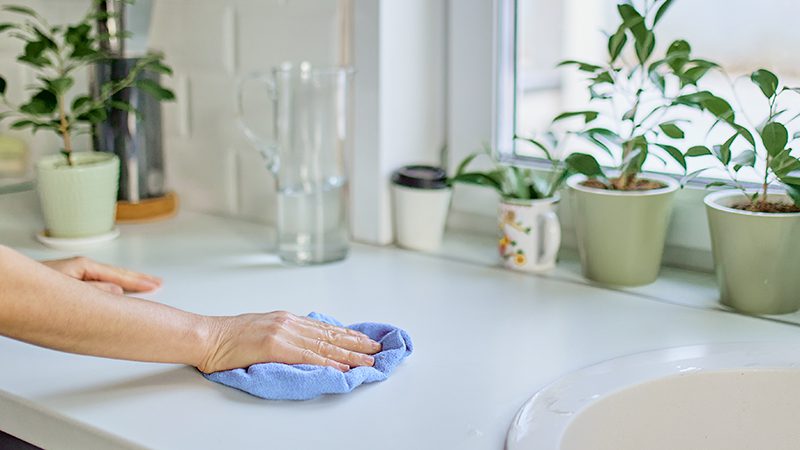Spring cleaning advice from a naturopathic physician
This article was originally published in April 2024

Spring is the traditional season for cleaning and refreshing your living space — and there are ways to make it a greener, safer process. Sound Consumer talked with Dr. Claire Zimmerman, a naturopathic doctor and registered herbalist, for her recommendations on safe, effective cleaning. She is an adjunct professor of naturopathic medicine at Bastyr University and is in private practice at Seattle Naturopathy & Acupuncture Center.
Personal care products are one of the places where “we can actually take steps and have some control” about what goes in our bodies, Zimmerman said. However, “there are not a lot of rules around what has to be on the label, so consumers are very in the dark about what they’re buying.” She appreciated PCC’s new cleaning standard, which requires manufacturers to list ingredients in their products and bars many harmful substances.
Avoiding toxic products is one key task she advises for her patients. Another is to maintain good indoor air quality.
Among her cleaning recommendations:
- Dusting is one of the most important steps you can take when spring-cleaning, and it doesn’t even require sprays or disinfectants. Dusting with a damp rag and maybe a few drops of essential oils works well (there are plenty of recipes online.) “We’re not trying to kill anything…” Zimmerman said. “You just clean all the dust out of the home and that improves indoor air quality, that then improves your health…you don’t have to Clorox bleach your house to do that.
- Do your best to avoid harmful cleaning and personal care products. One way is to look for labels like “no parabens” or “no phthalates” or “ammonia-free,” because companies are often proud of those distinctions and will advertise them (none of these are allowed in PCC cleaning products under the co-op’s cleaning standard).
- Not sure which ingredients raise red flags? Zimmerman recommends checking products on websites like the Environmental Working Group’s Skin Deep page or at Made Safe, and using apps like Think Dirty, which allows you to scan bar codes to spot “dirty” ingredients.
- Clear the air: If you can’t avoid harsh products — or if you happen to react even to mild ones — improving indoor air quality is extra-important. Open your windows, Zimmerman said, and turn on your vents. Get a good HEPA air filter if you can access one.
- Watch out for the word “fragrance” on labels, because fragrances can include problematic chemicals like the preservative formaldehyde. Look instead for words like “natural fragrances” or listings that specify that companies are using essential oils or plant compounds.
- Consider DIY: One way to know exactly what’s in your cleaning products is to make them yourself. (PCC’s recommendations include baking soda as a cleanser, and/or vinegar mixed with water and a few drops of essential oils.) Zimmerman often sends patients to the Mountain Rose Herb blog for recipes for natural cleaning products from toilet bowl cleaners to foaming hand soap. A lot of homemade cleaners are simple recipes relying on vinegar or baking soda, with a lot of creative options for natural scents. Homemade cleaners do work well, she said – and save a lot of exposure over time.
- Think long-term: “Overcleaning can actually set you up for worse outcomes,” she said. Research tells us children are far more likely to have compromised immune systems if they have high amounts of exposure to chemical cleaning agents, she said. Reducing the load on people’s systems from toxins and allergens improves their overall health and makes them more resilient. “I’m always trying to look to what can a person do in their day to day life…,” she said. “It’s hard to control wildfire smoke, (for instance), but we can work on what’s going on in the home.”
